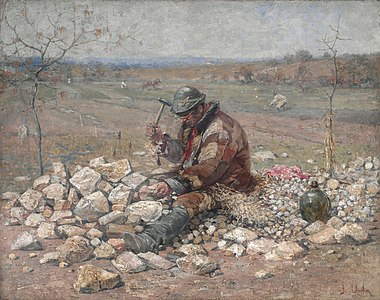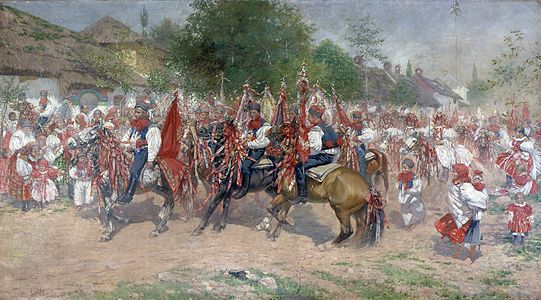Joža Uprka

Joža Uprka (26 October 1861, Kněždub – 12 January 1940, Hroznová Lhota) was a Czech painter and graphic artist whose work combines elements of Impressionism and Art Nouveau to document the folklife of Southern Moravia.
Biography

Uprka was born to a peasant family. His father was an amateur painter, which inspired Joža and his brother, František, to pursue careers in art.[1] After completing his primary education, he enrolled at the Academy of Fine Arts, Prague, where he studied with František Čermák. After Čermák's death, he transferred to the Academy of Fine Arts, Munich, where he was one of the founders of a Czech student organization called "Škréta" (after Karel Škréta), a group that included Alfons Mucha, Antonín Slavíček, Pavol Socháň and Luděk Marold.[2]
In 1888, Uprka returned home and began painting scenes from peasant life. He studied in Paris from 1892 to 1893 thanks to a scholarship. In 1894, with Mucha's assistance, Uprka gave a showing at the Salon. His first major exhibition in Prague came in 1897.[1]
Uprka was married in 1899, after which he bought a small house in Hroznová Lhota, which he used as a studio. In 1904, it was transformed into a two-story villa, inspired by folk architecture, with a design by Dušan Jurkovič.[2] It soon became a popular meeting place for many notable Czech artists, writers and composers. However, the following year, his wife's mental condition, which was always poor, took a turn for the worse and it was necessary to place her in the mental hospital at Kroměříž. She stayed there until her death in 1959.[2]
After this time, Uprka largely turned away from painting to do etchings. From 1922 to 1937, he lived in a castle in Ilava and maintained a studio in the Slovakian countryside, where he went for inspiration. In 1928, Uprka visited Dubrovnik, where he observed the local customs. His folk paintings received a major showing in Uherské Hradiště at the "Výstava Slovácka 1937". He died of kidney failure three years later and returned to his place of birth for burial.[2]
Selected paintings
- Pilgrimage to the chapel of Saint Anthony
above Blatnice - The Stonebreaker
References
- ^ a b "Biography". Hroznová Lhota (in Czech). Archived from the original on 29 April 2013.
- ^ a b c d "Joža Uprka: svébytný umělec nebo folklorista?" [Joža Uprka: An original artist and folklorist?]. Lidové noviny (in Czech). Mafra. 23 October 2011.
Further reading
- Štěpán Jež and Jakub Obrovský, Joža Uprka : k pátému výročí umělcovy smrti (On the fifth anniversary of his death), Sfinx, 1945
- Jaroslav Kačer, Joža Uprka : výběr z malířského díla (Selection of paintings), exhibition catalog, Moravian Gallery in Brno, 1983
- Petra Karpíšková, Příběh moderního tvůrce. Joža Uprka (1861-1940) (Story of a modern creator), Thesis, University of South Bohemia in České Budějovice, 2007 Online
- František Šantavý and Jaroslav Pelikán, Joža Uprka : Grafické dílo z let 1899–1937 (graphic works), Hodonín, 1981
- Joža Uprka: 1861-1940 : Evropan slováckého venkova (Rural Slovakia), National Gallery, Prague, 2011 ISBN 978-80-7035-482-7
External links
- Joža Uprka. Kožuchy ("Furs", a study of folk costume). Kroměříž, 1920. Online text (in Czech)
- Joža Uprka - barvy a písně (colors and songs) - video from Czech Television (in Czech)



